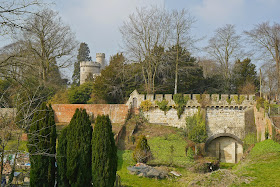The Market Square
Today looked to be the only bright day this week and so I decided on an outing. I fancied a town walk, but with a bit of country as well. I found this delightful walk on the AA website. It starts from the car park by the Kennet and Avon canal in Devizes.
You walk down Wharf Street and turn right into New Park St to soon reach Brownston House,which Pevsner described as "the best house in Devizes".
The route leads into Monday Market Street, where Great Porch House on the left claims the distinction of being the oldest in the town.
After continuing along the uninspiring Sheep St you turn right into Bridewell St, where the former bridewell can be seen on the right.
Turning right out of Bridewell St into Long St, you pass the Wiltshire Heritage Museum where a pound buys you the excellent descriptive booklet for the Town Trail.
Soon, on the left, is the town's major church, St John's, another Norman foundation. This time it is more obvious with the great crossing tower. As ever, there are 15th century and 19th century rebuildings.
Over in the far corner of the churchyard is the Sexton's House, which the blue plaque describes as former almshouses - Pevsner adds a date of 1615
Behind the Sexton's House, Devizes Castle can be glimpsed. The Norman castle of 1080 was the origin of the town. The original castle, presumably of wood, was burnt down in 1113 and quickly rebuilt on a grand scale. Like other early medieval castles, e.g. Corfe, it was "slighted"(i.e rendered unusable) after the Civil War.
As I left the churchyard to go into St John's Alley I was struck by this attractive group of buildings.
I was convinced that the stone cottages on the right must be former almshouses and when I saw the name God's House I was even more persuaded. Pevsner confirms that they are the former New Almshouses of about 1842, altered in 1895.
At the end of the alley, you pass the Town Hall of 1806 and further on along St John's St, over to the right, I enjoyed this wonderful facade.
On the corner was the handsome Old Town Hall of 1752. I preferred it to the new Town Hall, built just over 50 years later.
The Market Place now opens up before you with the Corn Exchange (1857) on the left and the Market Cross (1814) to the right. The Market Place is a vast space, the site of a market since the 14th century, surrounded by attractive houses.
You leave it by Northgate St, with the imposing presence of Wadworth's Brewery (1885) at the end.
Continuing past the brewery you reach the Kennet and Avon canal where you turn left to follow the tow path towards the celebrated Caen Hill locks. The path descends gently past a couple of locks and then you gradually realise that you are on the edge of a plateau.
The descent of the hill is about three quarters of a mile and covers 16 locks in remarkably close proximity to each other. Each lock has a large sideways-extended "pound", a pond to the uninitiated, to store the water needed to operate them.
This is the front-on view from the bottom. This section of the canal was designed by John Rennie and it was completed in 1810.
From the bottom, you simply retrace your steps to Northgate Street and continue along the tow path back to the Quay.
Conditions: bright and sunny, feeling quite warm in the sun.
Distance: 4.2 miles.
From: the AA website.
Rating: four stars. A lovely day out.















No comments:
Post a Comment